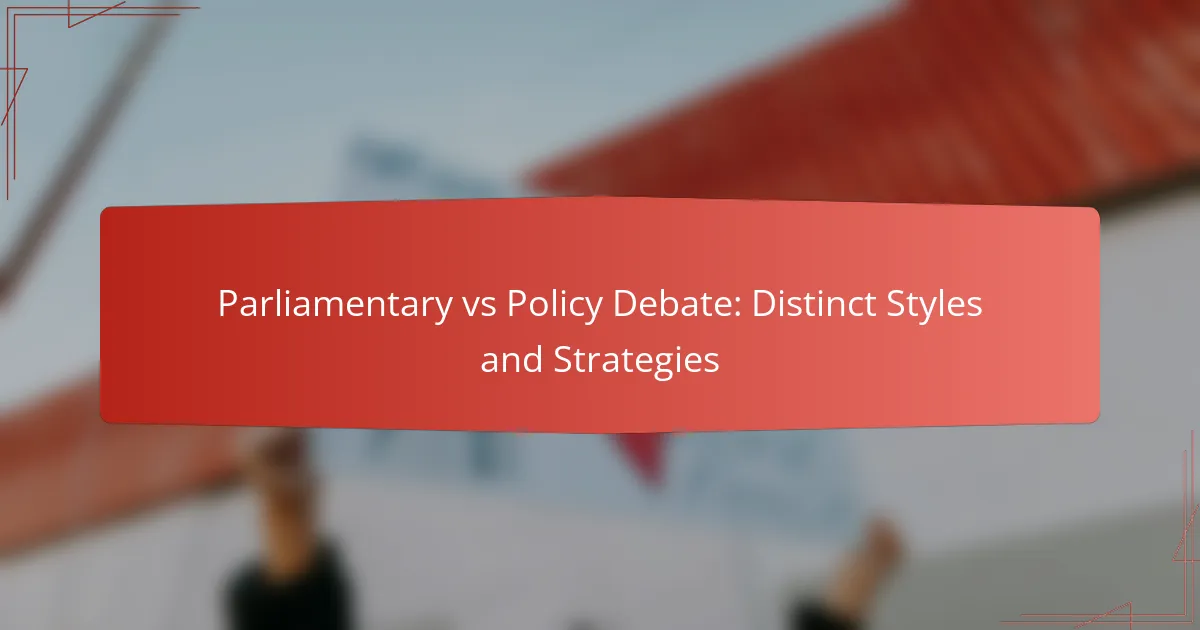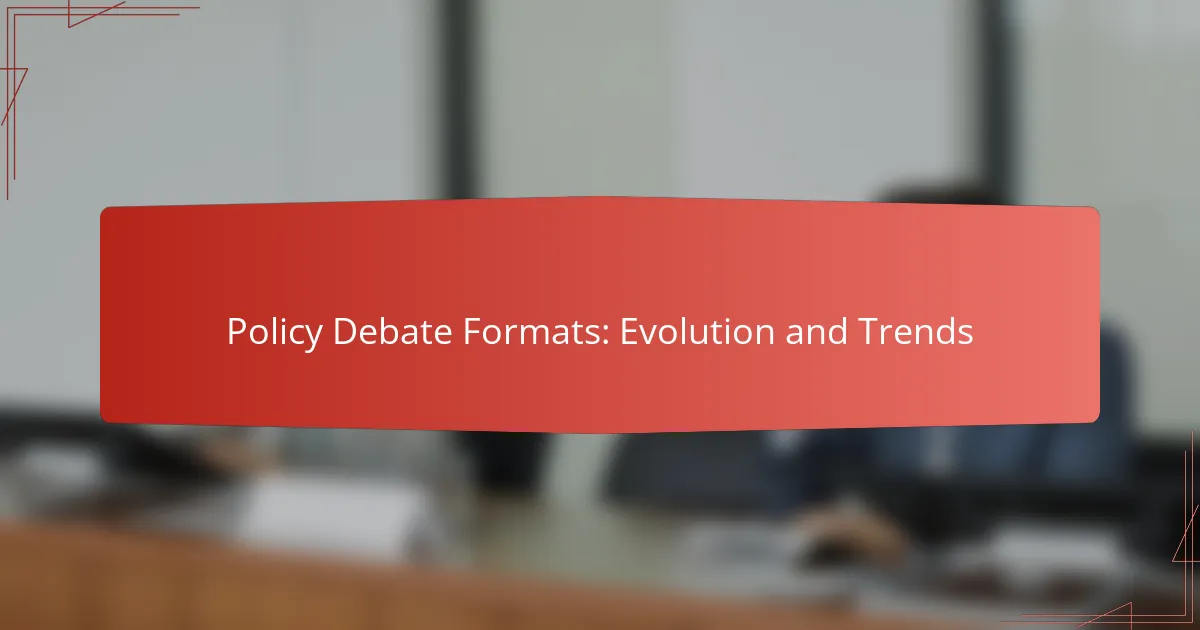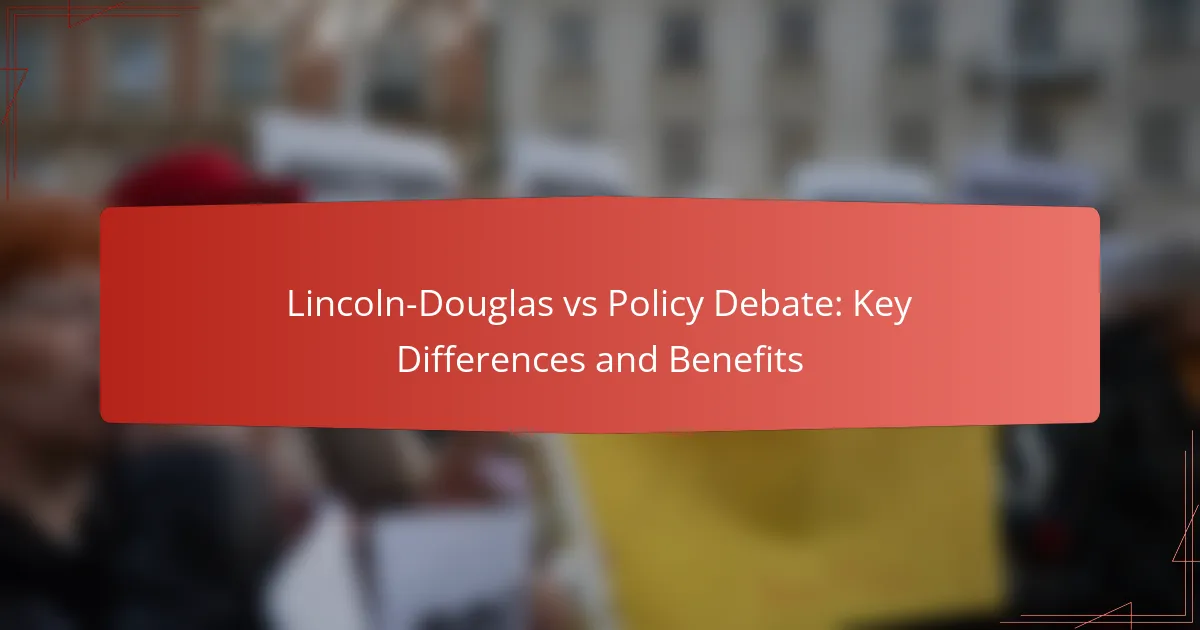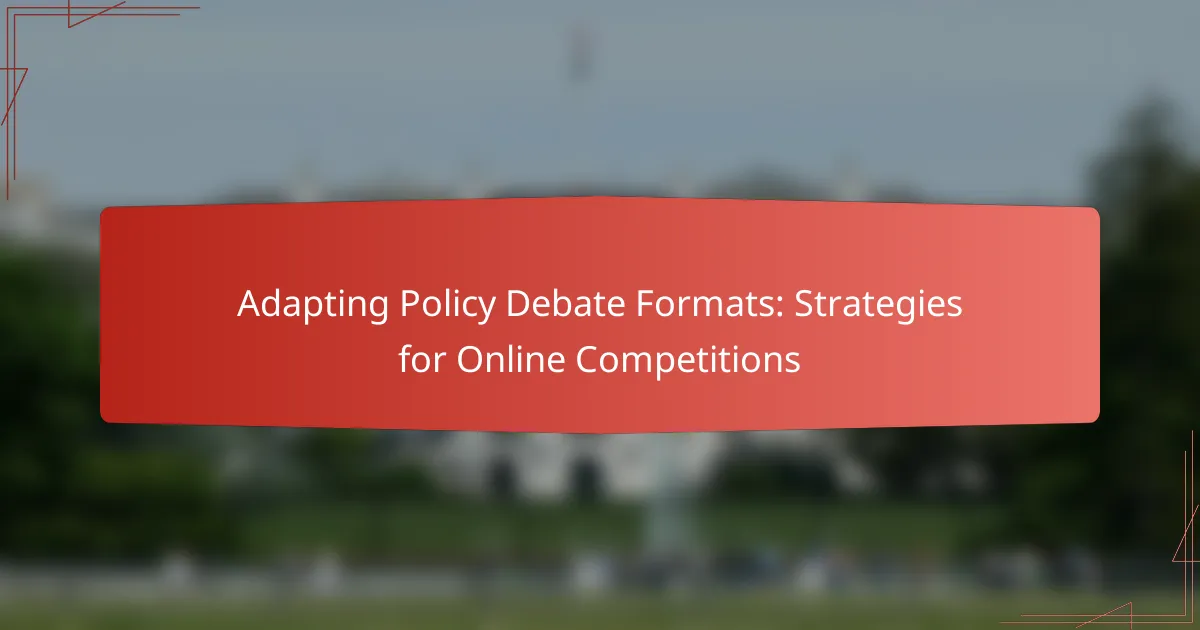Parliamentary and Policy Debate are two distinct formats that emphasize different styles and strategies. While Parliamentary Debate prioritizes quick thinking and adaptability, Policy Debate relies on extensive research and structured arguments, each requiring unique skills for success.
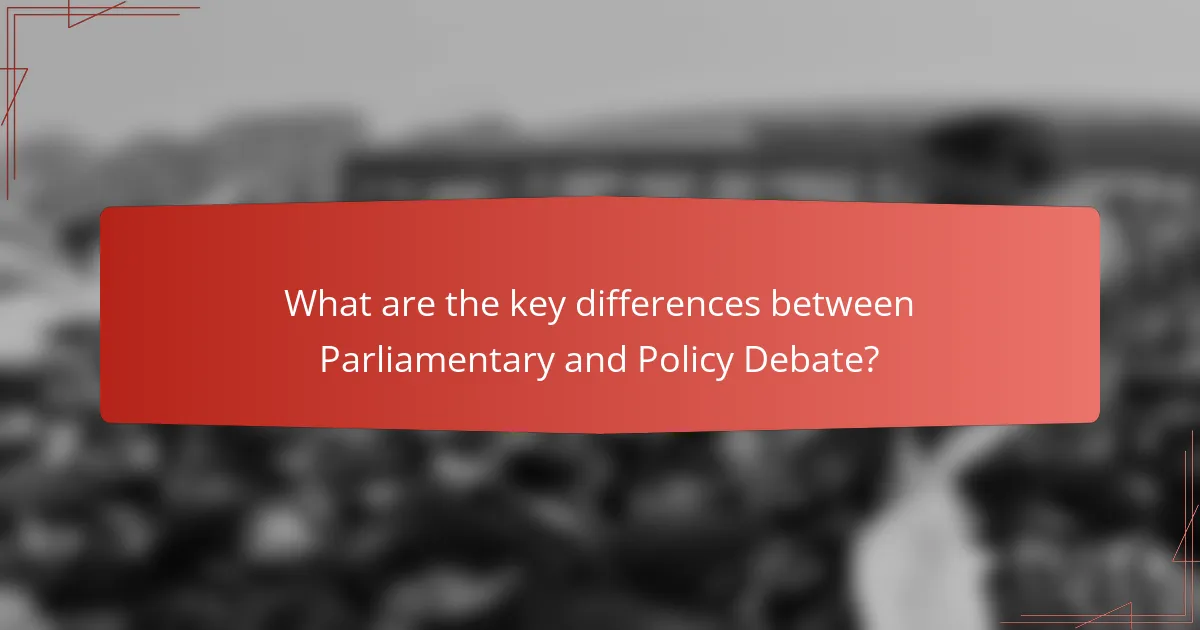
What are the key differences between Parliamentary and Policy Debate?
Parliamentary and Policy Debate are two distinct formats that emphasize different styles and strategies. While Parliamentary Debate focuses on quick thinking and adaptability, Policy Debate involves extensive research and structured arguments.
Structure and format
Parliamentary Debate typically consists of two teams, each with two speakers, who engage in a series of rounds with limited preparation time. The format encourages spontaneity, with topics announced shortly before the debate begins, allowing for a dynamic exchange of ideas.
In contrast, Policy Debate involves two teams of two speakers each, but the format is more structured. Debaters prepare extensively on specific policy issues, often using a pre-established resolution that guides their arguments. Rounds can last longer, allowing for in-depth discussions and rebuttals.
Judging criteria
Judging in Parliamentary Debate often emphasizes clarity, persuasion, and the ability to think on one’s feet. Judges look for effective communication and the ability to engage with the topic quickly, rewarding teams that can adapt their arguments to the flow of the debate.
In Policy Debate, judges focus more on the depth of research, logical structure, and the effectiveness of evidence presented. Teams are evaluated on their ability to construct coherent arguments and counterarguments, with a significant emphasis on the quality of their evidence and the clarity of their case.
Common topics
Parliamentary Debate topics can range widely, often covering current events, social issues, or philosophical questions. This unpredictability requires debaters to be well-versed in various subjects and to think critically about diverse viewpoints.
Policy Debate topics are usually centered around specific policy proposals, such as healthcare reform or environmental regulations. These topics are often predetermined for a season, allowing teams to prepare detailed cases and counterplans, which can lead to more focused and technical discussions.
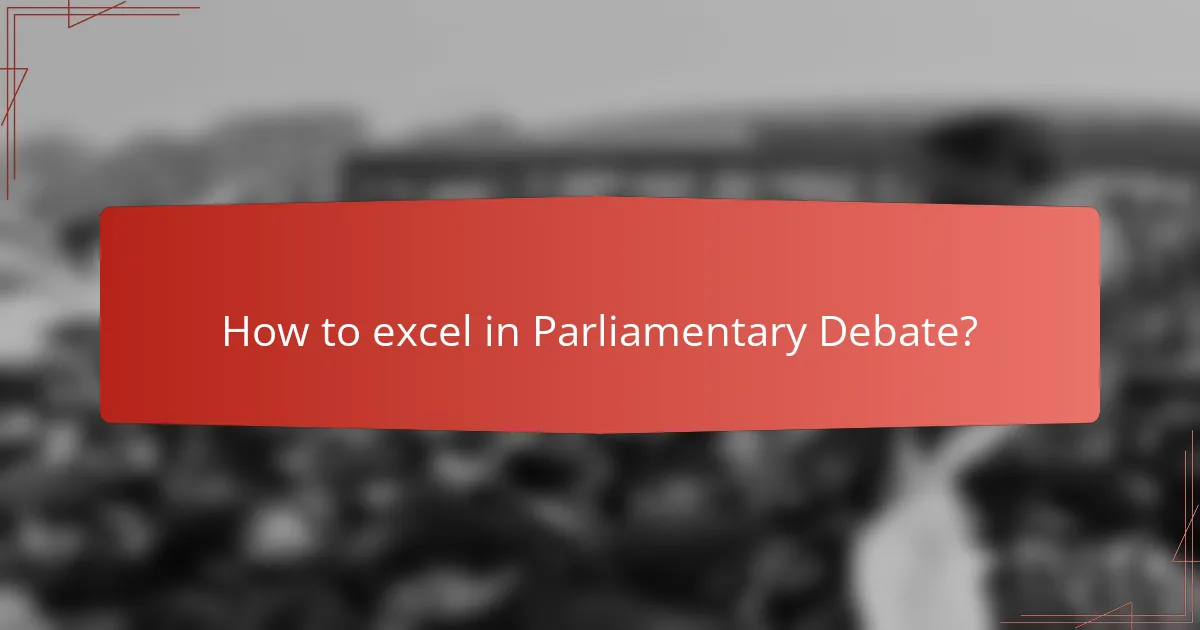
How to excel in Parliamentary Debate?
To excel in parliamentary debate, focus on developing strong speaking skills, effective research strategies, and solid argument construction. Mastering these elements will enhance your ability to engage with opponents and persuade judges.
Effective speaking techniques
Effective speaking in parliamentary debate involves clarity, confidence, and engagement. Use a strong voice and maintain eye contact to connect with your audience. Practice varying your tone and pace to emphasize key points and keep listeners interested.
Additionally, consider using rhetorical devices such as anecdotes or analogies to make your arguments more relatable. Avoid filler words and aim for concise, impactful statements that convey your message clearly.
Research strategies
Research is crucial in parliamentary debate as it provides the foundation for your arguments. Focus on gathering credible sources that offer diverse perspectives on the topic. Use academic journals, reputable news outlets, and expert opinions to build a well-rounded understanding.
Organize your research by creating a summary of key points and counterarguments. This will help you quickly reference information during the debate. Aim to have a mix of statistics, quotes, and examples to support your claims effectively.
Argument construction
Constructing strong arguments requires a clear structure: state your claim, provide evidence, and explain its significance. Start with a clear thesis statement that outlines your position, then follow with supporting evidence that backs it up.
Be prepared to anticipate counterarguments and address them within your argument. This not only strengthens your position but also demonstrates critical thinking. Use logical reasoning and ensure your arguments are relevant to the debate topic to maintain focus and clarity.
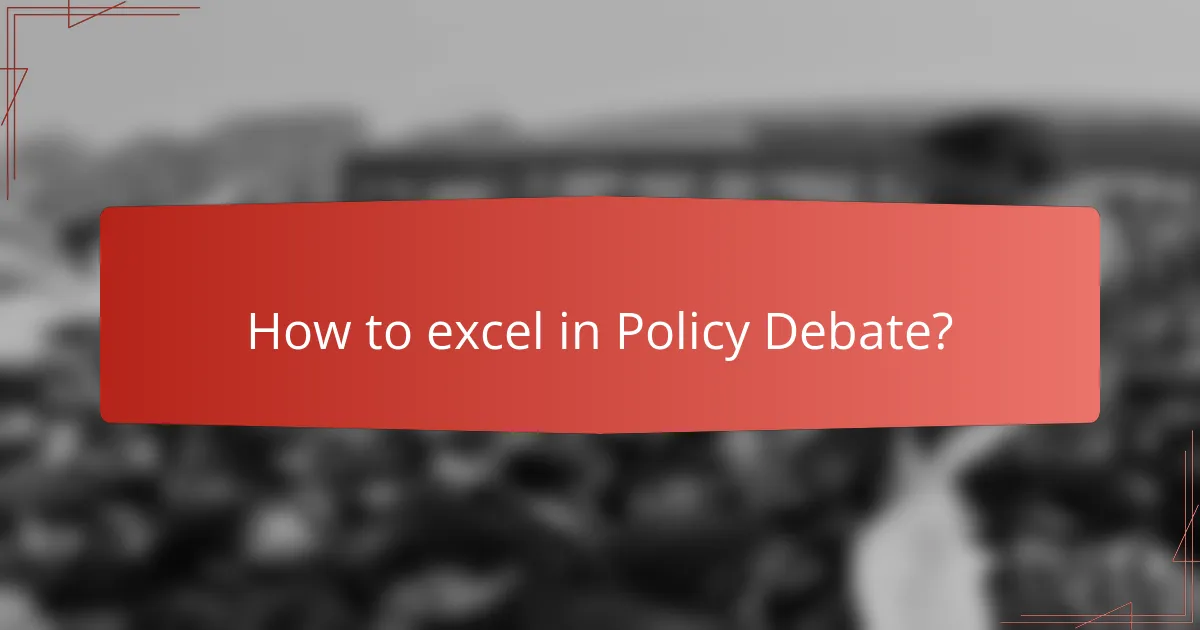
How to excel in Policy Debate?
To excel in policy debate, focus on thorough preparation, strategic questioning, and effective use of evidence. Mastering these elements will enhance your ability to construct compelling arguments and respond to opponents effectively.
Case preparation
Case preparation involves developing a strong, well-researched argument that outlines your position on a specific policy issue. Start by identifying a clear resolution and gather evidence to support your stance, ensuring you understand both sides of the debate.
Structure your case with a clear framework, including a problem statement, proposed solution, and anticipated impacts. Use bullet points to highlight key arguments, making them easy to reference during the debate.
Cross-examination tactics
Effective cross-examination tactics can significantly impact the flow of a policy debate. Focus on asking open-ended questions that reveal weaknesses in your opponent’s arguments while avoiding leading questions that may allow them to evade accountability.
Practice active listening to identify inconsistencies in their responses. Use follow-up questions to clarify points and press for detailed explanations, which can undermine their credibility and strengthen your position.
Evidence utilization
Utilizing evidence effectively is crucial in policy debate. Prioritize high-quality, credible sources that directly support your arguments, such as academic journals, government reports, and expert testimonies. Ensure your evidence is current and relevant to the resolution.
Incorporate a mix of quantitative data and qualitative analysis to appeal to different aspects of the debate. Use clear citations and be prepared to explain how your evidence supports your claims, enhancing your overall argumentation strategy.
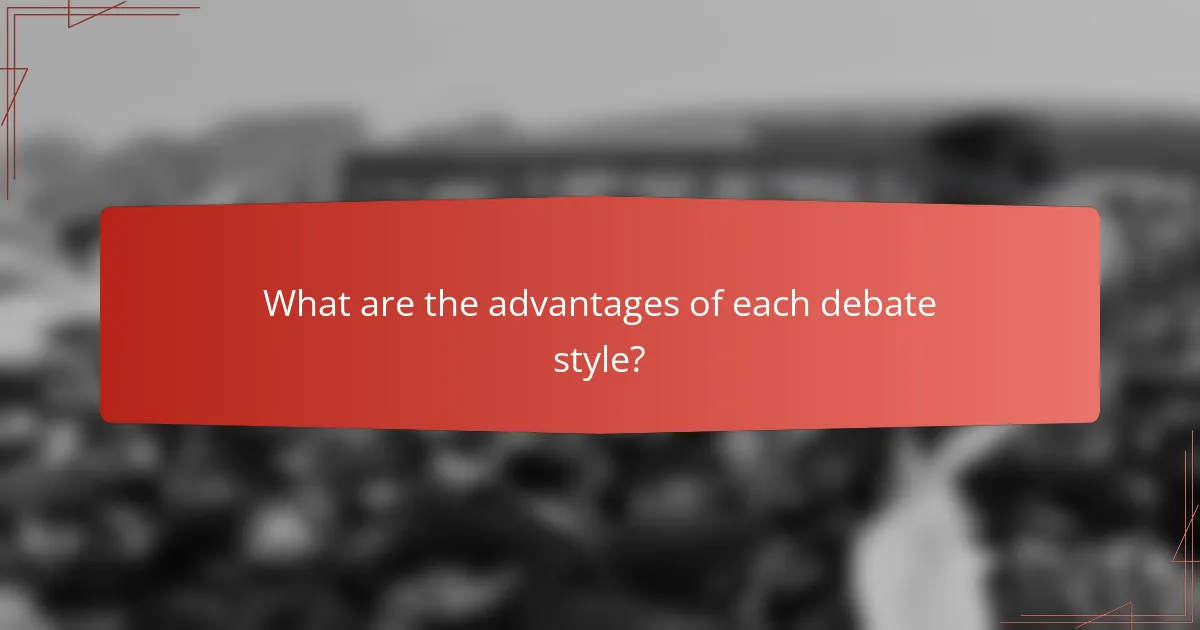
What are the advantages of each debate style?
Parliamentary and Policy Debate each offer unique advantages that cater to different skills and preferences. Parliamentary Debate emphasizes quick thinking and adaptability, while Policy Debate focuses on in-depth research and structured arguments.
Engagement and adaptability in Parliamentary
Parliamentary Debate thrives on engagement and adaptability, requiring participants to think on their feet. Debaters must respond to unexpected arguments and questions, which fosters quick decision-making and creativity.
This style often involves a lively atmosphere, encouraging audience interaction and making debates more dynamic. For instance, a debater might need to pivot their argument based on the opposing team’s stance, showcasing flexibility in their approach.
Depth of research in Policy Debate
Policy Debate is characterized by its emphasis on thorough research and detailed argumentation. Debaters spend significant time preparing evidence and constructing comprehensive cases, which allows for a deeper exploration of topics.
This style often involves extensive use of evidence, including statistics and expert opinions, to support claims. A common practice is to prepare a case file with multiple arguments and counterarguments, ensuring debaters are well-equipped to handle various scenarios.
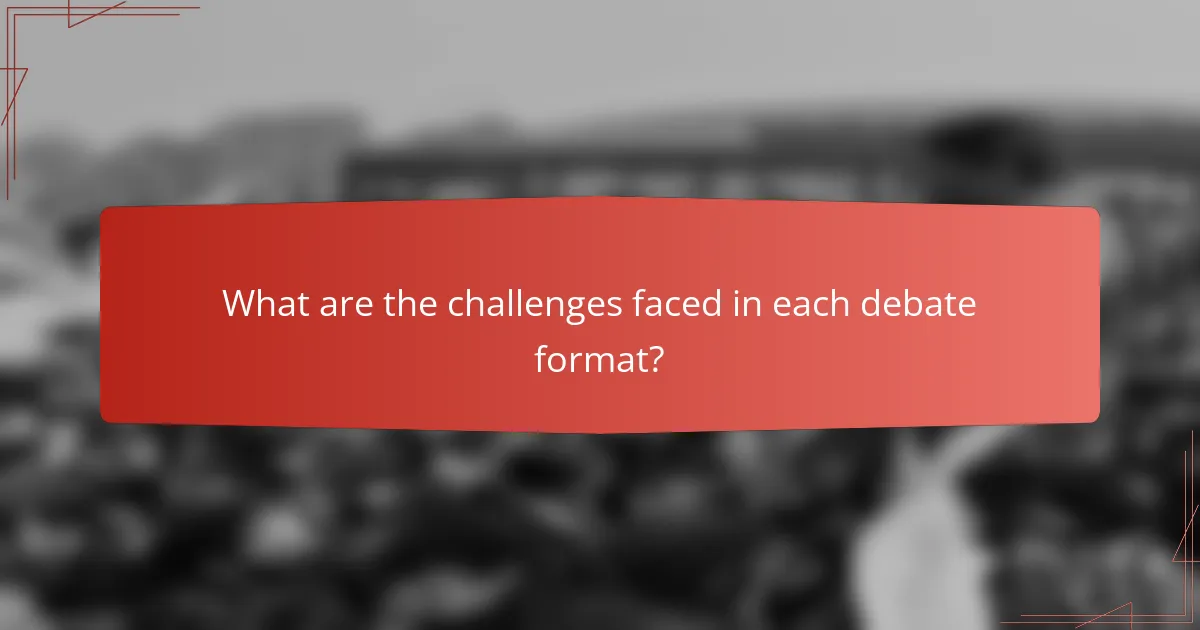
What are the challenges faced in each debate format?
Parliamentary and policy debates each present unique challenges that participants must navigate. Understanding these challenges can help debaters prepare more effectively and adapt their strategies accordingly.
Time constraints in Parliamentary
Parliamentary debates typically feature strict time limits that can range from a few minutes to around 15 minutes per speaker. This rapid pace requires debaters to think quickly and articulate their arguments succinctly, often leading to pressure and potential oversights.
Debaters must prioritize their points and practice delivering them clearly within the time frame. A common pitfall is attempting to cover too much ground, which can dilute the effectiveness of arguments. Focusing on key messages can enhance clarity and impact.
Complexity of policy issues
Policy debates often involve intricate issues that require in-depth understanding and analysis. Debaters must grapple with multifaceted topics, including economic, social, and legal implications, which can complicate argumentation.
To manage this complexity, debaters should focus on a few core arguments and support them with relevant evidence. It’s crucial to avoid overwhelming the audience with excessive details. Instead, presenting clear, well-structured arguments can make a significant difference in persuasiveness.
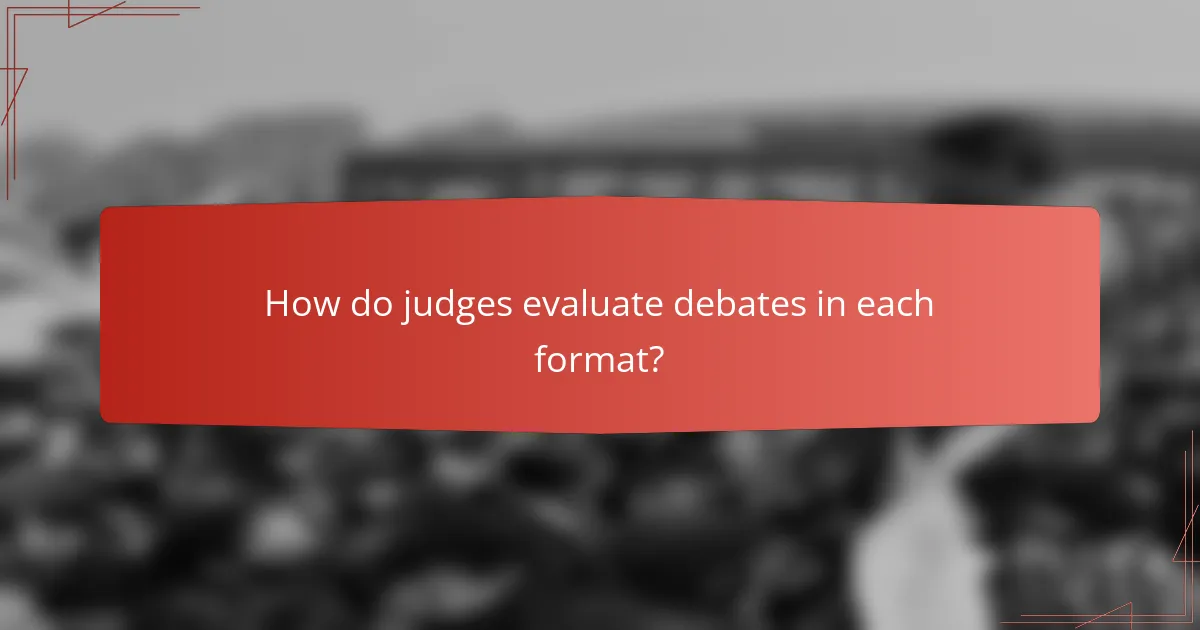
How do judges evaluate debates in each format?
Judges evaluate debates in parliamentary and policy formats based on distinct criteria tailored to the unique characteristics of each style. In parliamentary debate, judges focus on the persuasiveness and engagement of the arguments, while in policy debate, they assess the depth of research and the clarity of the policy implications.
Criteria for Parliamentary Debate
In parliamentary debate, judges prioritize the effectiveness of arguments, speaker engagement, and the ability to respond to opponents. The flow of the debate is crucial; judges look for clear, concise points that resonate with the audience and effectively counter opposing views.
Judges often consider the use of rhetoric and the debater’s ability to think on their feet. Engaging delivery and the ability to adapt arguments in real-time can significantly influence scoring. Common pitfalls include overly complex arguments that lose clarity and failing to address key points raised by opponents.
Criteria for Policy Debate
Judges in policy debate evaluate the depth of research, clarity of the plan, and the logical structure of arguments. They expect debaters to present well-supported cases with evidence and to engage critically with the opponent’s arguments. The focus is on the implications of the proposed policy and its feasibility.
Effective use of evidence and clear explanations of how the policy addresses the resolution are essential. Judges may look for specific impacts, such as economic or social benefits, and how well debaters anticipate counterarguments. A common mistake is presenting vague claims without sufficient backing, which can weaken a team’s position significantly.
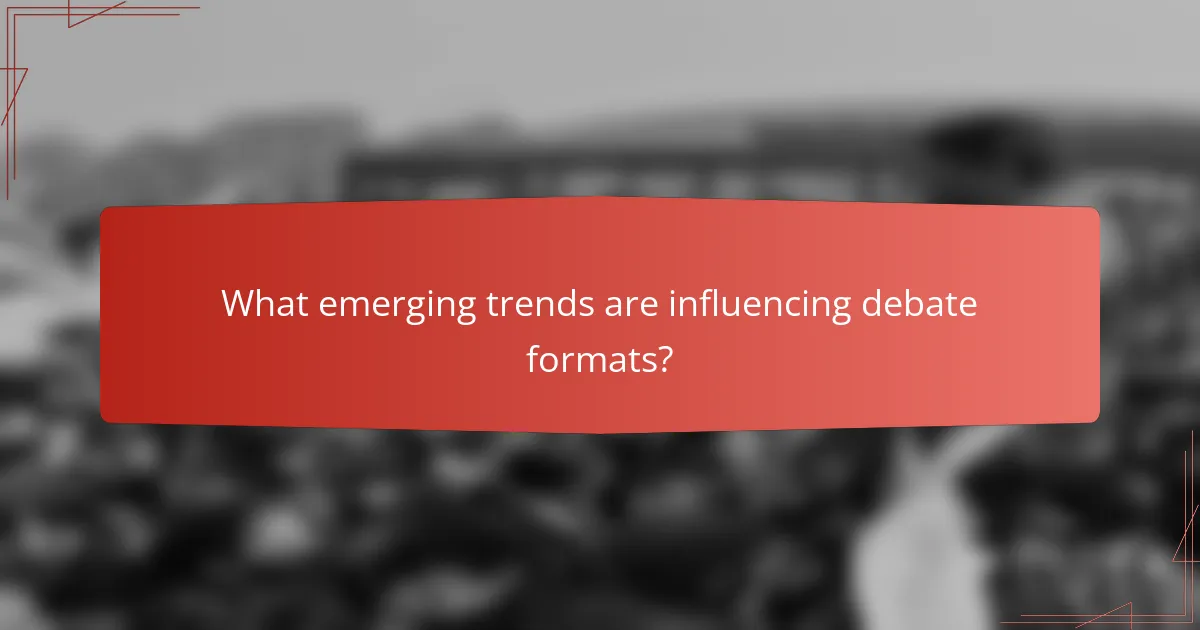
What emerging trends are influencing debate formats?
Emerging trends in debate formats are increasingly shaped by technology, audience engagement, and the evolving landscape of communication. These factors are prompting debaters to adapt their strategies and styles to remain relevant and effective.
Technology Integration
Technology is transforming debate formats by introducing digital platforms and tools that facilitate remote participation. Virtual debates allow for broader audience reach and the inclusion of diverse perspectives. Additionally, the use of social media for real-time feedback and audience interaction is becoming commonplace.
Focus on Inclusivity
Debate formats are increasingly prioritizing inclusivity, ensuring that diverse voices are represented. This trend encourages the participation of underrepresented groups, fostering a richer dialogue. Organizers are implementing measures to create welcoming environments, such as providing resources and support for novice debaters.
Audience Engagement
Engaging the audience has become a critical aspect of modern debates. Formats now often include interactive elements, such as live polls or Q&A sessions, allowing spectators to influence the discussion. This shift emphasizes the importance of connecting with the audience and making debates more dynamic and relevant.
Emphasis on Real-World Issues
Debates are increasingly centered around pressing real-world issues, such as climate change, social justice, and public health. This focus ensures that discussions are not only theoretical but also applicable to current events. Debaters are encouraged to incorporate case studies and practical examples to enhance their arguments.
